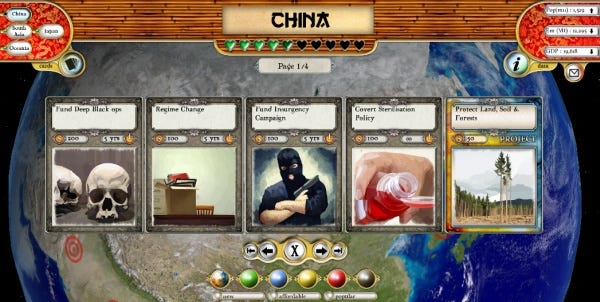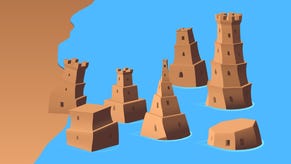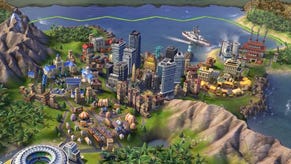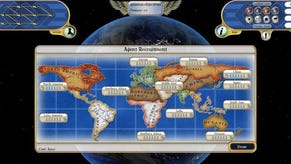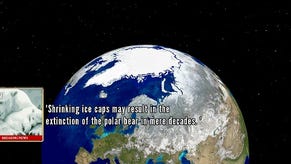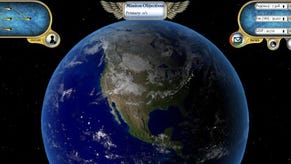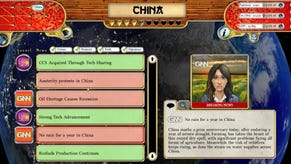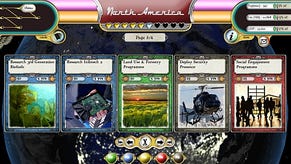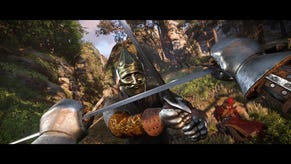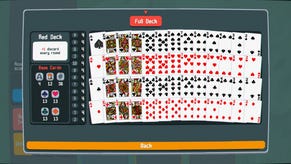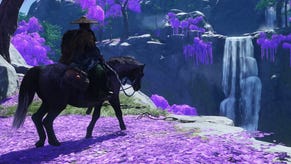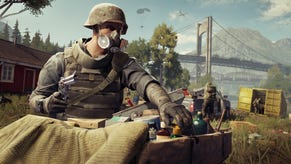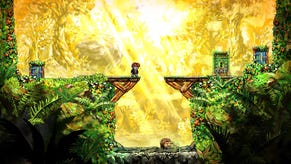Some Impressions: The Fate Of The World
Indie climate change strategy game Fate of the World has been on RPS’ radar for a while. As of this Monday, the beta’s been made available to all pre-order customers. Can RPS rescue our doomed world? There’s only one way to find out.
I'll admit to it now. I approached saving planet Earth with the same attitude I have to most games - figuring I'd beat the odds with nothing but some quick learning, lateral thinking and a dash of roguish risk-taking.
Yeah. About that.
The current build of the Fate of the World beta has only one scenario, entitled Oil Crisis.
As always, you're cast as the head of the GEO, a hypothetical governing body that's been given the power to institute just about whatever policies it likes in order to combat climate change and generally stop the world from crumbling like a wet biscuit into the murky tea of chaos.
In Oil Crisis, it is the year 2020. Your objective is simply to get to the year 2120. Each turn is 5 years, making that 20 turns. The game ends if the global temperature rises by 3 degrees, if your expenditures are higher than your funding, if the GEO is banned from operating in 8 of the game's 12 regions, or if the global HDI drops below 0.5 (meaning development of the world comes screeching to a halt).
Basically, just do the job. How you actually play Fate of the World is incredibly simple. Each turn you're given cash by all of the regions you're operating in. This cash can firstly be used to buy operatives, and each operative you have in a region gives you a slot to play a card in. The cards look like this:
And represent policies, actions or construction projects. Each turn you drop your cash instituting various cards, and maybe buy a few extra operatives, and then you end your turn and watch 5 years tick by. That's it.
Is the game, then, just picking sound policies? Swapping to nuclear and renewable energy sources? Researching advanced tech? Building carbon scrubbers?
Well, no. As you'll see above, each region has a wealth of stats that can be brought up. What you can there is a fraction of the info at your fingertips. Policies don't just need to be sound, they need to suit the region. An anti-deforestation program in Latin America can reap huge benefits. The same program in Europe will simply sit in one of your card slots like a fat, rectangular lump.
SO: Do you simply click your teeth while examining the numbers, then pick the most suitable policies?
Well, no. Because these are troubled times, and you're being funded by the whole planet. If you're not causing a direct improval in a region's quality of life, the GEO will get kicked out of that region, or your operatives will get murdered, or both. In any case, you won't be getting any more funding from them.
Here's how my end of turn summary looked at the beginning of the game:
And here's what it looked like after 20 years:
The GEO was as popular as a fart in a submarine. My decision to tackle the kids who were killing the planet as opposed to the ones who were actually dying caused India and North Africa to punt the GEO out, meaning less funding for me and no influence in those areas.
And here's the same chart after 50 years:
I had entered proper Billy No-mates territory. My actions had led me to being abandoned by half the world. On the plus side, I was still receiving enough funding to look after the other half, who just thought I was a bit of a shit.
At this point, my game shifted. I began simply trying to keep the GEO alive by lessening the misery caused by peak oil, so the other regions wouldn't kick me out. Latin America was a sore point.
If I could just hang on for five more years, they might change their tune. I abandoned my (achingly effective) anti-deforestation program, and focused on dropping unemployment and building Aid centres. If nothing bad happened in the next 5 years, the people of Latin America might start seeing the long-term benefits of these operations and SON OF A BITCH-
And that was how my operatives ended up taking charter flights out of Latin America.
So. Fate of the World is a game where you click your teeth while looking at numbers to determine effective policies, while attempting a political balancing act to do with easing the globe's suffering?
Well, no. Because sometimes a decent policy in one region will dick over another region catastrophically.
In my game, it was biofuels. I needed an alternative to oil, and biofuels struck me as a good choice. Renewable and clean? Perfect. Sign me up. What I didn't predict was the crippling effect my encouragement of biofuel adoption in first world countries would have on lesser economically developed countries. With farms growing less actual food, food prices went up, causing anger and starvation and snapping assorted economies like twigs.
This is Fate of the World. You think, you scheme, you rub your chin, you decide on your plan, you cast the die and then the game tells you fucked up, and the walrus is dead.
Fate of the World is almost certainly the most brilliant educational game I've ever played, and its brilliance is in its simplicity. The rules of the game are swallowed in seconds, and from there you do nothing but thinking and learning. Thinking, because the game offers nothing else- there are no animations or repetition, and learning because despite the game's apparent simplicity you keep making mistakes, and you want to fix them, but fixing them causes more mistakes, and then you want to fix them.
Because you're close to something amazing! You really are! The predicted temperature of the Earth 100 years from now is dropping. You saved the Orangutan. You prevented those flash-floods from causing untold pain in the Middle East. The Earth is opening up to you like a Rubix-cube, its patterns shifting, locking and unlocking in unexpected ways. There is a way to solve this puzzle. You know there is. But it's always just out of reach.
After I'd built flood barriers and instituted some wildlife protection programs, Europe quickly became my stronghold, from where I'd commission research. But research into what? In this beta build, you can't click on cards to access real-world information on them, something I was pining for. Did I want to research superconductor tech? What's a superconductor? I needed to learn.
I suspect that Fate of the World is going to earn itself a great deal of attention in the media, as well it should. For an enjoyable game to be married so effectively with education, and on such an important issue, makes me want to take off my shirt and jump around. But then I'd put the shirt back on, because it's cold and the central heating's off because I'm trying to save electricity and I think that's probably saving the planet and not killing somebody on another part of the planet. Probably. If there's a bad side to Fate of the World, it's that it teaches a hopeless skeptic on most policies.
If you're curious about Fate of the World and want in the beta, remember that a pre-order is all it takes. Good luck, and remember... remember to... ...ah, shit, I've got no tips.
Who knew saving the world would be so hard?
